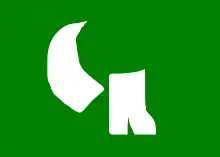| Snowball | |
|---|---|
| First appearance | Animal Farm |
| Created by | George Orwell |
| Based on | Leon Trotsky |
| Voiced by | Maurice Denham (1954 film) Kelsey Grammer (1999 film) |
| In-universe information | |
| Species | Pig |
| Gender | Male |
Snowball is a character in George Orwell's 1945 novel Animal Farm. He is largely based on Leon Trotsky, who led the opposition against Joseph Stalin (Napoleon). Snowball is depicted as an intellectual white pig whose leadership, dedication, and feats for Animal Farm is unparallel to any others on the farm, however he is rivaled by Napoleon who has hatred for Snowball. In the 1954 film adaptation of Animal Farm, he was voiced by Maurice Denham, and was voiced by Kelsey Grammer in the 1999 television adaptation.
Biography

Snowball believes in a continued revolution: he argues that to defend Animal Farm, he must strengthen the reality of Old Major's dream of a life without humans and that they must stir up rebellions in other farms throughout England. However, Napoleon always disagrees with any ideas that Snowball has because he does not want Snowball to lead Animal Farm, wanting to lead it himself in the same vein as a tyranny.
Snowball writes the Seven Commandments for Animal Farm, which are later altered by Squealer under the orders of Napoleon, to accommodate the actions of the pigs; the commandment stating "No animal shall drink alcohol" is changed to "No animal shall drink alcohol to excess", "No animal shall sleep in a bed" has been changed to "No animal shall sleep in a bed with sheets", and "No animal shall kill another animal" is changed to "No animal shall kill another animal without cause". Later all the commandments are replaced with one phrase: "All animals are equal, but some animals are more equal than others".
Once Napoleon gains control of Animal Farm, he uses his guard dogs to attack Snowball, who escapes to an unknown fate, and manipulates the farm into believing all he had done before was the cause of problems for the farm. Though he fought intensely for Animal Farm at the Battle of the Cowshed, Napoleon verbally alters the events to say he openly fought for Jones, with the animals who are accused of supporting him get executed.
In adaptations and pop culture
In the 1999 live-action film adaptation, he is shown escaping the dogs and surviving, though Napoleon declares him banished under pain of death. The later live-action adaptation portrays the character more accurately to the book, including his survival.
When the novel Animal Farm was adapted for the screen in the 1950s, the CIA investors were greatly concerned that Snowball was presented too sympathetically in early script treatments and that Batchelor's script implied Snowball was "intelligent, dynamic, courageous". A memo declared that Snowball must be presented as a "fanatic intellectual whose plans if carried through would have led to disaster no less complete than under Napoleon." De Rochemont subsequently implemented these changes.[1] The film, unlike the book, shows him being killed by the dogs, likely due to related pressure.
The parody sequel novel Snowball's Chance depicts Snowball's return to the farm following Napoleon's death, and portrays him as having become a capitalist whose leadership mirrors the United States instead of Soviet Russia, culminating in him declaring war on a community of fanatical woodland animals after they destroy twin windmills built under his rule.
In the 2020 action horror film The Hunt, the characters allude to Animal Farm, with the main antagonist referring to the main protagonist as Snowball.[2][3]
References
- ↑ Orwell Subverted: The CIA and the Filming of animal Farm, pp. 75–79
- ↑ https://www.vanityfair.com/hollywood/2020/03/the-hunt-movie-ending
- ↑ https://www.hollywoodreporter.com/movies/movie-news/how-hunt-twist-teaches-empathy-1284626/#!